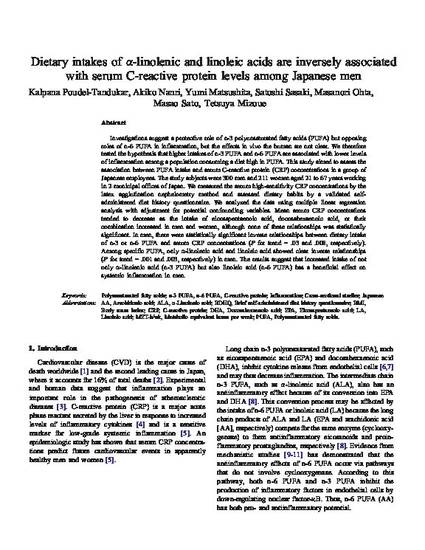
Article
Dietary intakes of α-linolenic and linoleic acids are inversely associated with serum C-reactive protein levels among Japanese men
Nutrition Research
(2009)
Abstract
Investigations suggest a protective role of n-3 polyunsaturated fatty acids (PUFA) but opposing roles of n-6 PUFA in inflammation, but the effects in vivo the human are not clear. We therefore tested the hypothesis that higher intakes of n-3 PUFA and n-6 PUFA are associated with lower levels of inflammation among a population consuming a diet high in PUFA. This study aimed to assess the
association between PUFA intake and serum C-reactive protein (CRP) concentrations in a group of Japanese employees. The study subjects were 300 men and 211 women aged 21 to 67 years working
in 2 municipal offices of Japan. We measured the serum high-sensitivity CRP concentrations by the latex agglutination nephelometry method and assessed dietary habits by a validated selfadministered diet history questionnaire. We analyzed the data using multiple linear regression analysis with adjustment for potential confounding variables. Mean serum CRP concentrations
tended to decrease as the intake of eicosapentaenoic acid, docosahexaenoic acid, or their combination increased in men and women, although none of these relationships was statistically
significant. In men, there were statistically significant inverse relationships between dietary intake of n-3 or n-6 PUFA and serum CRP concentrations (P for trend = .03 and .008, respectively).
Among specific PUFA, only α-linolenic acid and linoleic acid showed clear inverse relationships (P for trend = .001 and .003, respectively) in men. The results suggest that increased intake of not
only α-linolenic acid (n-3 PUFA) but also linoleic acid (n-6 PUFA) has a beneficial effect on systemic inflammation in men.
Keywords
- Polyunsaturated fatty acids,
- n-3 PUFA,
- n-6 PUFA,
- C-reactive protein,
- Inflammation,
- Cross-sectional studies,
- Japanese
Disciplines
Publication Date
Summer June, 2009
DOI
10.1016/j.nutres.2009.05.012
Citation Information
Kalpana Poudel-Tandukar, Akiko Nanri, Yumi Matsushita, Satoshi Sasaki, et al.. "Dietary intakes of α-linolenic and linoleic acids are inversely associated with serum C-reactive protein levels among Japanese men" Nutrition Research Vol. 29 Iss. 6 (2009) p. 363 - 370 Available at: http://works.bepress.com/kalpana-poudel-tandukar/6/
